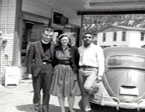Stonewall Jackson in the Classroom
James C. Hiden was a member of the Virginia Military Class of 1857. This account first appeared in the Montgomery, Alabama Advertiser, November 27, 1892, and was also published in the Southern Historical Society Papers, Vol. 20 (1892), p. 307. It was later published in the VMI Cadet newspaper on March 17, 1910.
"Stonewall Jackson. Reminiscences of Him as a Professor in the Virginia Military Institute. Some of His Peculiarities Shown."
"...But Jackson's life, as a teacher, was singularly monotonous. He seldom opened his mouth except from absolute necessity. As Dick Taylor said "If silence is golden, Jackson was a bonanza." He had his text-books, and he prescribed the lessons--fearfully long and desperately hard lessons they were--and at the appointed time he "heard" them, and this was about all of it. Discussions in the class-room were unknown, and even explanations were infrequent, and when they did occur they usually left the matter where they found it. The text was the one great thing which he came to "hear," and we came to "say," if we could, and most of us commonly couldn't, when the said text was Bartlett's Course of Natural Philosophy, in three of the toughest volumes that this scribe ever attacked--"Mechanics," "Optics and Acoustics," and "Spherical Astronomy."
...When I went in the "Third Class," I used to see Allen tugging over "Old Jack's" terrible lessons in Bartlett's Optics, and one day I opened the book and found on the fly-leaf the following stanza, which I suspect was Allen's own:
But oh! believe it not, my lark;
I've studied it with all my might
And still it's left me in the dark.
Major Jackson was perfectly at home in the long, intricate and multitudinous "equations" and other mathematical formulas which make up so large a part of Bartlett's three volumes, and many of the cadets often expressed the belief that none of these ponderous tomes contained an equation or a formula which "Old Jack" could not repeat "by heart."
And yet, with all his minute and accurate acquaintance with the course, there was very little teaching done in that department, unless teaching be understood to mean the prescribing and hearing of lessons. Teaching, in the modern sense of that term, was not Jackson's forte. His silence was phenomenal, and sometimes portentous. He had no turn for explanation, no talent for putting things in various points of view, so as to adapt them to the various mental conditions of his pupils. During the war he was often and highly commended for keeping his plans to himself; but I doubt if he could have explained those plans if he had done his best
Though I drilled under him for three years, and recited to him daily for a year and a half, I never saw him laugh outright. A very quiet, subdued sort of smile was the nearest thing to laughter that I ever saw him indulge in; and those smiles were very infrequent, and, indeed, occurred only when outrageously ludicrous things took place in his immediate presence.
If Davidson Penn, a portent of mischief, put on an uncommonly serious face and asked, apparently in good faith, "Major, can a cannon be so bent as to make it shoot around a corner?" the Professor of Artillery would show not the slightest sign of merriment or impatience, but would, after a moment of sober reflection, reply: "Mr. Penn, I reckon hardly." We could never decide whether his gravity on such an occasion was real or assumed, but, if it was assumed, it was certainly well acted."
.svg)
.png)
